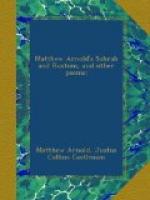=16. Pausanias.= A noted Greek geographer and
writer on art who lived in the second century.
“His work, The Gazetteer of Hellas, is
our best repertory of information for the topography,
local history, religious observances, architecture,
and sculpture of the different states of Greece.”—K.O.
MUeLLER, History of the Literature of Ancient Greece.
[192]
=21-22. Dante= (1265-1321), =Petrarch= (1304-1374),
=Tasso= (1544-; 1595), =Ariosto= (1475-1533).
Celebrated Italian poets.
=25. Raphael= (1483-1520). The famous Italian painter.
=29. Goethe= (1749-1832). The greatest name in German literature. His works include poetry, dramas, and criticisms. =Wordsworth= (1770-1850). See the poem, Memorial Verses, of this volume.
=35. Mozart= (1766-1791), =Beethoven= (1770-1827), =Mendelssohn= (1809-1847). Noted musicians and composers.
=42. south.= Warm.
=43-48.= Cyclops Polyphemus, famous in the story of Ulysses, was a persistent and jealous suitor of Galatea, the fairest of sea divinities. So ardent was he in his wooings, that he would leave his flocks to wander at will, while he sang his uncouth lays from the hilltops to Galatea in the bay below. Her only answers were words of scorn and mockery. See Andrew Lang’s translation of Theocritus, Idyl VI, for further account.
=70-76. Abbey towers.= That is, Westminster Abbey, a mile’s distance to the south and east of Hyde Park. The abbey is built in the form of a cross, the body or lower part of which is termed the nave (l. 73). The upper portion is occupied by the choir, the anthems of which, with their organ accompaniments, are alluded to in ll. 74-77.
=89-106. Miserere Domine!= Lord, have mercy! These words are from the service of the Church of England. The meaning in these lines is that Beethoven, in his masterpieces, has transferred the thoughts and feelings, above inadequately expressed in words, into another and more emotional tongue; that is, music.
=107. Ride.= A famous driveway in Hyde Park, commonly called Rotten Row.
=119. vacant.= Thoughtless; not occupied with study or reflection.
“For oft, when on my
couch I lie
In vacant or in pensive mood.”
—WORDSWORTH’S Lines
to the Daffodils, ll. 19-20.
=124. hies.= Hastens (poetical).
[193]
=130. painter and musician too!= Arnold held poetry
to be equal to painting and music combined.
=140. movement.= Activities. Explained in the following lines.
=163-210.= Note carefully the argument used to prove that poetry interprets life more accurately and effectively than any of the other arts. =Homer=, the most renowned of all Greek poets. The time in which he lived is not definitely known. =Shakespeare= (1504-1616).




